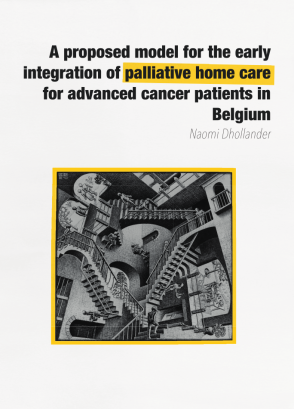Author: Naomi Dhollander
Date: 25/11/2019
Promotors:Prof. dr. Luc Deliens (Universiteit Gent), Prof. dr. Koen Pardon (Vrije Universiteit Brussel)
Co-Promotor: Prof. dr. Simon Van Belle (Universiteit Gent)
SUMMARY OF THE DISSERTATION
Patients with advanced and incurable cancer typically suffer from a multitude of severe symptoms that often appear to be undertreated. Palliative care, defined as ‘an approach that improves the quality of life of patients and their families facing life-threatening illness through prevention and relief of symptoms’ (WHO definition), is an approach that can mitigate these problems, but is typically only provided late in the course of the disease, when death is imminent.
Recent studies have shown that offering palliative care early on – e.g. from diagnosis of advanced cancer – and integrated into the oncological treatment has beneficial effects on the patient’s and family caregiver’s quality of life and mood, and even on survival time. However, these models of integration are all developed for the hospital setting. Because the majority of patients with advanced cancer wants to be cared for at home and prefers to die at home, a model focusing on the early integration of palliative home care in oncology care is needed.
This dissertation explores the existing barriers for early integration of palliative home care in oncology care and the differences between early and late involvement of palliative home care. Furthermore, an intervention model for early integration of palliative home care in oncology care is developed following the steps of the Medical Research Council Framework. This model is then tested in a pilot pre post study on its feasibility and acceptability.

